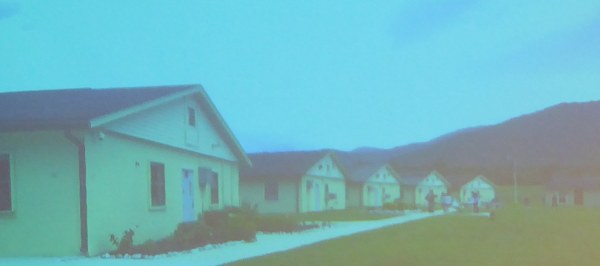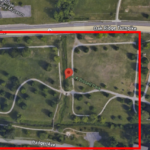
Brad McLean, left, program director of the Morgan County Residential Recovery Court, welcomes the commitment of Rev. Bob Cantrell and Presbyterians to help residents “reconnect with the community.” (Submitted photo)
By Carolyn Krause
The United States has a broken criminal justice system and a huge drug addiction epidemic, and the country leads the world in the number of people who are in prisons and jails. More than half of released prisoners re-offend and return to prison within three years.
Brad MacLean, an award-winning Nashville attorney and opponent of the death penalty who lives in Clinton, decided more than two years ago to help combat these major issues. He created and is supervising the nation’s first statewide residential drug recovery court, a pilot program and potential model for other states. On August 1, 2013, the Morgan County Residential Recovery Court opened at the Morgan County Correctional Complex, a state prison for men.
MacLean, who had volunteered in Judge Seth Norman’s residential drug court for Davidson County inmates, is program director at the Morgan County residential recovery court for nonviolent, drug-addicted felons across the state.
It has had “significant success,” he told members of First Presbyterian Church last Sunday. He gave an example of a court graduate who became completely sober, married his girlfriend, and works as a mechanic and painter of cars.
He spoke to the church group because he is looking for people to interact with the convicts being treated for drug abuse at the residential court.
“They need to learn how to reconnect with the outside community,” he said.
The Rev. Bob Cantrell, former minister at First United Methodist Church and a regular attendee at First Presbyterian, will lead a group of Presbyterians in conducting a weekly Bible study and interacting with a group of recovery court residents, starting in September.
The incarceration rate in the U.S. has multiplied five times since 1970, and the drug abuse problem has gotten steadily worse despite politicians’ 44-year “war on drugs,” MacLean said. Between1999 and 2010, the nation has seen an explosive rise in the number of prescription pills sold, drug overdose deaths, and drug addicts committed to treatment programs. Punishment of drug-addicted offenders has failed to solve the problem.
MacLean said he and others are convinced that “drug addiction drives the criminal behavior” of many convicts, which includes stealing to “feed their drug habit.” Tennessee has at least 40 county drug courts (including one in Anderson County) that provide outpatient drug therapy, counseling, behavior modification (through rewards, incentives, and sanctions), and drug testing to inmates who must live in supervised halfway houses.
MacLean views drug courts as a “bright spot in the criminal justice system,” adding that addiction to illegal drugs is a “chronic lifetime illness” that can be treated successfully in the drug court system in two to three years. The residential court takes nonviolent felons referred by county drug courts across the state. Most have been addicted to prescription opiates like oxycontin, methamphetamine, and heroin. After the residents graduate in nine to 14 months, they return to their drug courts, which will help them find jobs.
Since 1970, Tennessee’s Department of Corrections has seen a 26 percent increase in the prison population and a 50 percent rise in the jail population. Currently, 95 percent of the state’s prison cells are filled, straining the state budget. The cost of incarceration has increased from $700 million to $900 million in the past five years. The residential recovery approach helps the state save money, MacLean said, because residents cost almost half what prison inmates do.
The residents, including a few veterans battling PTSD, run their own community, keeping their rooms tidy, cooking, planting, and harvesting vegetables and making repairs. Each day they hear lectures on topics such as parenthood and the science behind addiction, get group counseling, study for a GED, learn work skills, help build Habitat for Humanity homes, and attend 12-step Narcotics Anonymous classes. To learn more about the drug court concept developed 16 years ago, watch the YouTube video “Drug Court: The Beginning” by All Rise.

Dorms where the residents of the drug recovery court stay. They can hold 40 to 48 residents. (Submitted photo)
Copyright 2015 Oak Ridge Today. All rights reserved. This material may not be published, broadcast, rewritten, or redistributed.




Leave a Reply